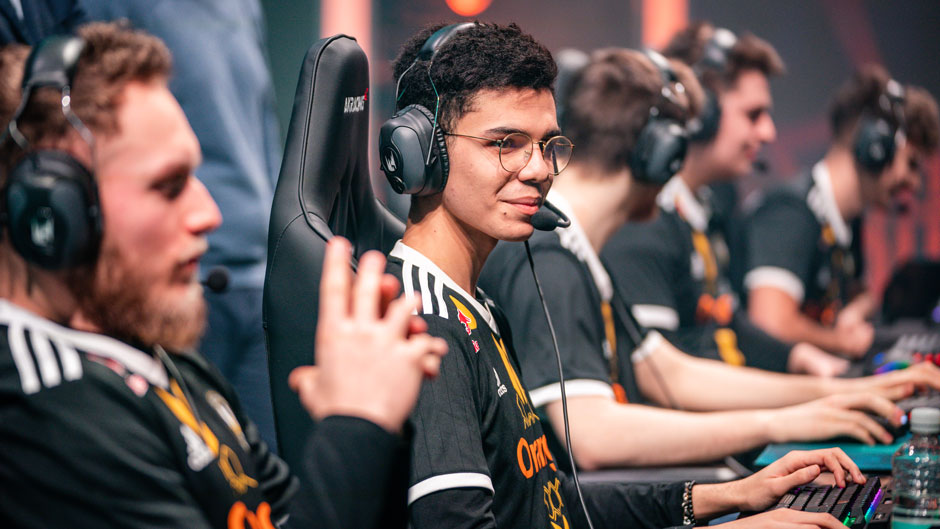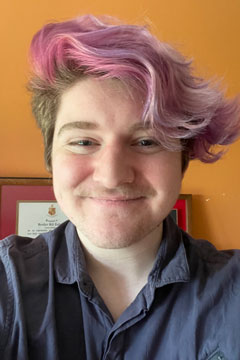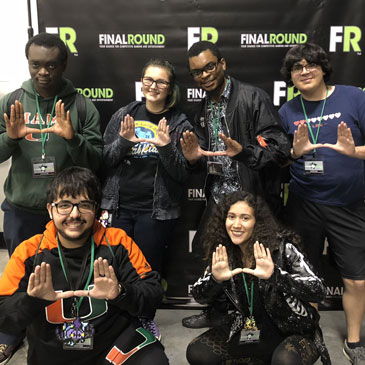University dives into the esports academic arena
Janette Neuwahl Tannen, 07-15-2021

Just five years ago, Avery Tallman was a high school freshman eager to join his new school’s sports teams. In middle school, Tallman enjoyed running cross-country, playing volleyball and soccer, as well as participating in his favorite sport, basketball.
But when Tallman began to get tendonitis in his knees that year, he realized his active lifestyle might need to change. He had played video games since he was 5 years old, so Tallman decided to put more of his energy into that. Soon, he started playing the game Overwatch competitively and joined a team. In its first season, the team won a tournament.
“I needed something to fuel my competitive fire from all those years, so I started playing competitive video games,” said the University of Miami sophomore, who is studying sport administration in the School of Education and Human Development.
Today, Tallman is an esports enthusiast, regularly watching video game competitions online to refine his craft, while also hoping to forge a career in the industry. He spends his free time searching for talented amateur players to join teams for Depth Esports, a small operation where he is the director, and is also team captain of the University’s budding esports team that will compete with other colleges to play a game called Valorant.

He is eager to learn more, so Tallman is elated that the University is making its first foray into esports—the rapidly growing industry built around multiplayer video game competitions—by offering an online Global Esports Management Certificate Program starting in September.
The flourishing esports industry is generating revenues in excess of $1 billion and attracting a growing audience of international video gamers. At the League of Legends world competition in 2019, the tournament had an estimated 100 million viewers, topping the Super Bowl at some points, according to media reports. And corporate sponsors like Coca-Cola, Red Bull, and Louis Vuitton recognize that the millions of people watching these competitions and playing the video games are a captive global audience. Even the NBA has created its own esports league and draft around the video game NBA2K, and teams like the Miami Heat, Orlando Magic, and Cleveland Browns are partial owners in Misfits Gaming Group, a South Florida business that builds professional esports teams.
“There is significant potential in this field,” said Rebecca MacMillan Fox, dean of the Division of Continuing and International Education, whose Office of Professional Advancement crafted the new program in conjunction with Sport Administration faculty members in the Department of Kinesiology and Sport Sciences. “I believe the program is perfectly positioned at just the right time to help students and professionals take full advantage of this growth market.”
Offered through the University’s School of Education and Human Development in collaboration with the Division of Continuing and International Education, the non-credit certificate program will offer students access to five modules that cover different aspects of the esports industry, including marketing and data insights, event experiences, sponsorships, and communications. The program is also taught by faculty members from the Department of Kinesiology and Sport Sciences, along with seasoned esports industry leaders. It is estimated to last five weeks but is self-paced to allow for flexibility.
“Esports is a viable niche within the sports industry, so this program is for anyone interested in esports or in learning more about the business side of esports,” said Warren Whisenant, sport administration professor and chair of the Department of Kinesiology and Sport Sciences. “It’s a very different business model and this gives participants the opportunity to learn more about the industry.”
Students who finish the program will receive a certificate of completion from the University and a digital badge that can be displayed on their social media profiles, websites, and email signatures.
Recognizing the growing number of people interested in gaming, the University's Department of Wellness and Recreation also launched an esports program this spring for students, faculty, and staff members to play casual or competitive video games. Tom Soria, director of recreational sports programs, said he was able to unveil the program a few months ago by starting a server on Discord—a digital platform—for players in the University community to chat, play games together, and form teams. The program has grown to 160 users so far and is increasing daily, Soria said, with many incoming first-year students joining this summer. The University now has a team for a game called Rocket League, while Tallman is in the process of forming a Valorant team, and Soria is hoping to find more team managers.
“People are looking for these types of programs, so it is great that now we will have some academic connections to the esports industry,” Soria said about the certificate program.

Jaclyn Levine, president of the University’s student-led Video Games Club, said that she has noticed a spike in interest across campus in competing at esports tournaments during the past few years. The club even formed a team called Storm Surge, so they could enter competitions for several different games. She stated that she definitely sees a value in offering an academic program focused on esports.
“In talking to some past graduates and our members, there are many of them who want to go into gaming. So, I think it would be very helpful to show that you know the management side or some of the mechanics of the industry,” she said. “Gaming used to be seen as nerdy, but I think it’s becoming much more mainstream. That burgeoning interest was there before, and then COVID-19 lockdowns watered those seeds because people didn’t have anything to do but to play video games.”
Tallman agrees. “There are a bunch of different colleges making headway in the realm of esports, and even smaller schools than UM are making huge waves. So, I thought it was time UM dipped their toe in the water,” he said. “The fact that UM is offering a program and trying to forge their own way in esports is really inspiring.”